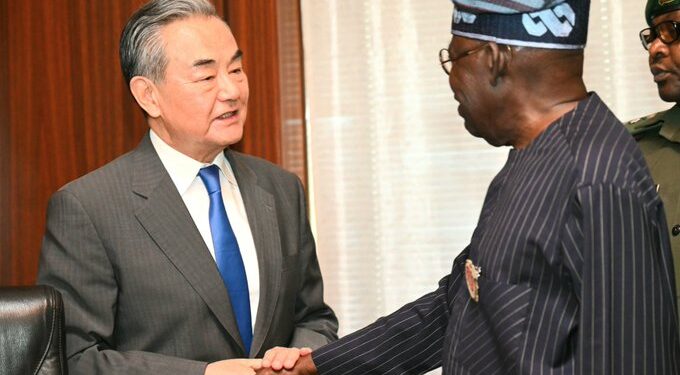The Chinese government is considering Nigeria’s request to expand their bilateral currency swap agreement, according to China’s Foreign Minister, Wang Yi. This was revealed during a press briefing at the Aso Rock Villa in Abuja after Wang’s meeting with President Bola Tinubu.
Originally established in 2018, the currency swap deal between the People’s Bank of China and the Central Bank of Nigeria was valued at ¥15 billion (approximately ₦720 billion or $2.5 billion at the time). The agreement aimed to reduce reliance on the US dollar, stabilizing Nigeria’s foreign reserves and encouraging trade and investment between the two nations.
Wang emphasized the ongoing strength of financial cooperation between China and Nigeria and proposed new opportunities, such as Nigeria issuing Panda bonds in Chinese markets. Panda bonds are renminbi-denominated bonds issued by foreign entities in China’s domestic market, offering access to China’s liquidity and diversifying funding sources for the issuer. Wang expressed confidence in Nigeria’s economic stability and highlighted the potential of these bonds to finance critical infrastructure projects, such as railway modernization.
“Our financial cooperation has been fruitful, and we will favorably study Nigeria’s request to expand the currency swap,” Wang said. He added that Panda bonds could provide Nigeria with significant revenue streams while ensuring financial safety and supporting the nation’s development agenda.
China’s commitment to Nigeria’s infrastructure was underscored by the recent financial support from Chinese banks for Phase III of Nigeria’s railway modernization project. Wang encouraged further consultations with the Chinese Embassy for details on ongoing initiatives, while reiterating China’s eagerness to deepen bilateral cooperation.
Regional Security Partnership
Wang and Nigeria’s Foreign Minister, Yusuf Tuggar, also discussed African security. Both nations rejected foreign interference in Africa’s internal affairs, advocating for African-led peacekeeping and counterterrorism initiatives. China pledged ¥1 billion in military assistance, including training 6,000 military personnel and 1,000 police officers across Africa, while supporting the African Standby Force.
Wang praised Nigeria’s role as ECOWAS chair and a key player in West African stability, promising China’s full backing in regional security efforts. Tuggar echoed the sentiment, emphasizing Nigeria’s focus on domestically producing military equipment with China’s support to reduce reliance on international procurement.
“Our strategy is to solve our challenges locally,” Tuggar stated. “With partnerships like this, Nigeria will lead regional security efforts with strength and collaboration, ensuring long-term stability.”
China and Nigeria’s upgraded partnership, formalized last year, continues to promote mutual prosperity through enhanced trade, agriculture, finance, and security collaborations.
























